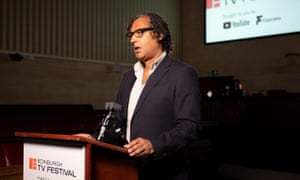Historian David Olusoga talked of being isolated and devalued in the TV industry. It shouldn’t have to be such an act of courage.

British television is failing us. It’s excluding stories, talent, on and offscreen, and promoting only a “pathetic” number of people from minority-ethnic backgrounds to positions of power.
These are not my contemporary thoughts. They’re the verdict of broadcasting chiefs back in 2000, when I was still in my teens. Twenty years ago all Britain’s major broadcasters were together promising to radically improve diversity and representation, to stop the “endless meetings” and to reflect the “plain realities of life”.
It was an era when David Olusoga – a man now recognised as one of the best historians and presenters on British TV – found himself, in his own words, “sidelined, dismissed and desperately unhappy”. Giving the MacTaggart lecture at the Edinburgh TV festival this week, he disclosed that the racism and prejudice he encountered had left him “so isolated and so devalued that I twice slipped into clinical depression”.
Olusoga’s candour and courage prompted widespread media coverage. That he described his experience so eloquently on such a prestigious platform was certainly news; yet the content of that experience, for many other minority-ethnic people who work in TV, was not.
The subtext was important. Olusoga admitted his reluctance to expose himself so honestly before what he described as “the tribes of television”, because it was a genuine unknown to him if, at the end of it, he would still have a career. That speaks to the penalty attached to drawing on your lived experiences of racism, in an attempt to make things better. These acts of public service – offered in a spirit of tough love for the media industry we so value – can prompt summary punishment. In order for the industry to progress, it seems, we must take the personal risks.
This is a conversation that the Alternative MacTaggart, a companion event to the one featuring Olusoga, echoed when I met the presenter, activist and actor Jameela Jamil. Our discussion, which is broadcast today, centred on Jamil’s experience of being vilified by the media for calling out the body shaming, racist, ableist and non-inclusive practices that still remain standard. Having lived with mental ill health, disability and a near fatal accident, she felt she had sufficiently little to lose to do it anyway. That doesn’t explain or justify the personal abuse she faces for telling the truth.
